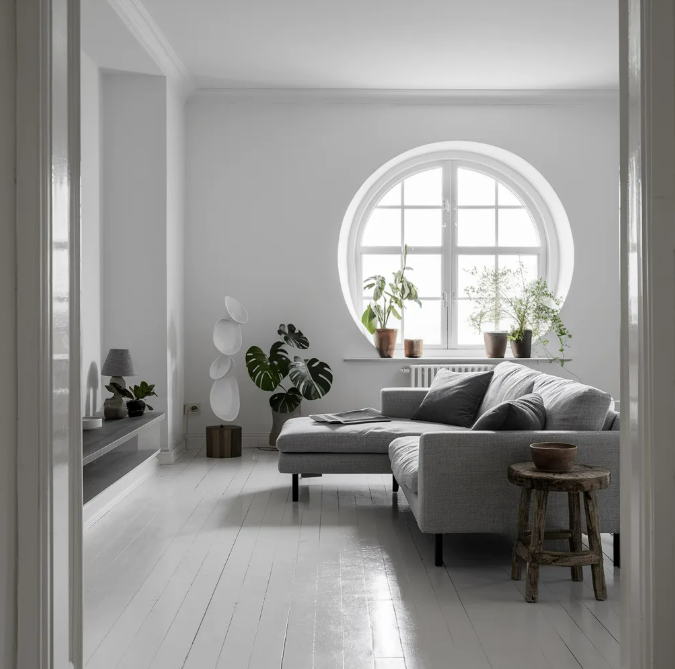The minimalist design aesthetic is characterized by simplicity, clean lines, and a clutter-free environment. When applied to a living room, it creates a tranquil and inviting space that is both functional and stylish. This article provides essential tips for designing a minimalist living room, ensuring a harmonious blend of aesthetics and practicality. Whether you’re starting from scratch or looking to declutter and streamline your existing living room, these tips will help you achieve a minimalist look.
Key Takeaways
- Minimalist living rooms prioritize simplicity and functionality.
- Choosing the right furniture and decor is crucial for a minimalist aesthetic.
- Proper organization and decluttering are essential to maintain a minimalist space.

Design Principles of a Minimalist Living Room
Simplicity and Functionality
A minimalist living room focuses on simplicity and functionality. Every piece of furniture and decor should serve a purpose and contribute to the overall aesthetic. Avoid unnecessary items that can clutter the space. Instead, choose functional furniture with clean lines and simple designs. For example, a sleek, low-profile sofa paired with a simple coffee table can create a clean and open feel in your living room.
Neutral Color Palette
A neutral color palette is a hallmark of minimalist design. Opt for shades of white, beige, gray, and other muted tones. These colors create a serene and calming atmosphere, making the space feel open and airy. You can add visual interest with subtle variations in texture and material. For instance, a beige sofa with a soft wool throw, a gray rug, and a few white ceramic vases can create a visually appealing yet cohesive look.
Quality Over Quantity
In a minimalist living room, less is more. Invest in a few high-quality pieces rather than filling the space with numerous items. Choose furniture and decor that are durable, timeless, and versatile. This approach not only enhances the room’s aesthetic but also reduces clutter. A well-made, elegant armchair or a sturdy wooden coffee table can serve as focal points without overwhelming the space.
Choosing Minimalist Furniture
Essential Pieces
Focus on essential pieces of furniture that serve multiple functions. A comfortable sofa, a coffee table, and a simple media unit are typically all you need. Opt for furniture with sleek designs and avoid bulky or ornate pieces. Consider pieces like a Scandinavian-style sofa, a mid-century modern coffee table, and a minimalist TV stand.
Multi-Functional Furniture
Multi-functional furniture is ideal for a minimalist living room. Consider a coffee table with storage space, a sofa bed for guests, or a modular shelving unit that can be reconfigured as needed. These pieces maximize functionality while maintaining a clean and uncluttered look. For example, a storage ottoman can provide seating, serve as a coffee table, and offer hidden storage for blankets or books.
Selecting Minimalist Decor
Simple and Functional Decor
Choose decor items that are simple, functional, and aligned with the minimalist aesthetic. A few well-chosen pieces can make a significant impact. For example, a large mirror can create a sense of space and light, while a single piece of artwork can serve as a focal point. Avoid cluttering your space with too many decorative items; instead, focus on a few impactful pieces that add to the room’s overall harmony.
Natural Elements
Incorporate natural elements to add warmth and texture to your minimalist living room. Wooden furniture, plants, and natural textiles like linen and cotton can soften the space and make it feel more inviting. These elements bring a touch of nature indoors, enhancing the serene ambiance. A wooden coffee table, a few potted plants, and a linen throw can make the space feel more organic and welcoming.

Maintaining a Clutter-Free Environment
Organization and Storage Solutions
Effective organization is key to maintaining a minimalist living room. Use storage solutions that keep items out of sight and maintain the room’s clean lines. Built-in cabinets, floating shelves, and storage ottomans are great options. Keep surfaces clear and only display a few carefully selected decor items. For instance, a floating shelf can hold books and a few decorative items, keeping the rest of the room uncluttered.
Regular Decluttering
Regular decluttering is essential to keep your living room looking minimalist. Periodically assess your belongings and remove items that are no longer needed or used. Adopt the “one in, one out” rule to prevent clutter from accumulating. This practice ensures that your living room remains functional and visually appealing. Make it a habit to regularly donate or discard items that no longer serve a purpose.

Lighting and Ambiance
Natural Light
Maximize natural light in your living room to create a bright and airy space. Use sheer curtains or blinds that allow light to filter in while maintaining privacy. Position mirrors opposite windows to reflect light and make the room feel larger. A well-lit room not only looks more spacious but also feels more inviting and comfortable.
Minimalist Lighting Fixtures
Choose lighting fixtures that complement the minimalist aesthetic. Simple, geometric designs in materials like metal or glass work well. Consider a combination of ambient, task, and accent lighting to create a well-lit and inviting space. For example, a sleek floor lamp can provide ambient light, while a minimalist pendant light over the coffee table can serve as a focal point.
Popular Minimalist Living Room Trends
- Open Floor Plans: Many homeowners are opting for open floor plans to create a more spacious and modern look. This involves removing unnecessary walls to create a larger, more cohesive living area.
- Smart Home Technology: Integrating smart home systems for lighting, security, and temperature control is becoming increasingly popular. These systems offer convenience and energy efficiency, making them a valuable addition to any minimalist living room.
- Eco-Friendly Materials: There is a growing trend towards using sustainable materials like bamboo flooring and recycled glass countertops. These materials are not only environmentally friendly but also add a unique aesthetic appeal.
- Minimalist Art and Decor: Minimalist art pieces, such as abstract paintings and monochromatic prints, are becoming popular choices for adding visual interest without overwhelming the space.
Average Renovation Timeframes for Minimalist Living Rooms
| Renovation Area | Typical Duration |
| Flooring Installation | 1-2 weeks |
| Painting and Wall Finishes | 1-2 weeks |
| Furniture Delivery and Setup | 1 week |
| Lighting Installation | 1 week |

Common Challenges and Solutions in Minimalist Living Rooms
- Limited Space: Many minimalist living rooms are in smaller homes or apartments, where space is limited. Solution: Use multi-functional furniture and built-in storage solutions to maximize space and maintain a clutter-free environment.
- Maintaining Simplicity: It can be challenging to maintain a minimalist aesthetic in a busy household. Solution: Implement regular decluttering practices and adopt a mindset of minimalism, focusing on quality over quantity.
- Creating Warmth: Minimalist designs can sometimes feel cold or sterile. Solution: Incorporate natural elements, such as wood and plants, and use warm lighting to create a more inviting atmosphere.
By understanding these trends, timeframes, and challenges, homeowners can better prepare for their minimalist living room projects and make informed decisions that align with current styles and practical considerations.
Conclusion
Designing a minimalist living room involves focusing on simplicity, functionality, and quality. By choosing essential furniture pieces, incorporating natural elements, and maintaining a clutter-free environment, you can create a serene and stylish space that embodies the minimalist aesthetic. With careful planning and thoughtful choices, your living room can become a tranquil haven that reflects the principles of minimalist design.



